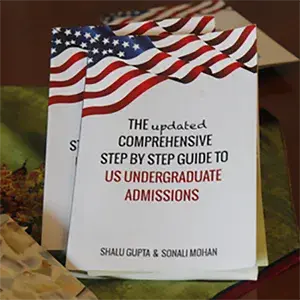
When it comes down to standardized tests, be it SAT/ACT, the Math-section often tends to give the students a hard time. There are a lot of common problems a student face while preparing for the SAT or ACT.
Based on queries we receive every day on the college application process, we had the privilege of holding an informative discussion with the expert counsellor, Sonali Mohan.
Sonali Mohan is a remarkable Harvard Summer Institute certified Consultant in the process of college admissions and a co-author of a published book titled ‘The Comprehensive step by step guide to US Undergraduate Admissions’ (available on Amazon http://bit.ly/US_Adm)

Getting through the entire process of College Application gets a bit challenging and intimidating for students. With Sonali Mohan’s instructive help, we have composed detailed FAQs that will definitely help the students assuage some of the fears surrounding the application process.
Q 1. How early should a student start with the college application process, and what are the main components of an ideal college application/ profile?
A- The application process should ideally start in grade 9. A standard application stands on 4 important pillars.
1. Standardized Tests i.e. SAT, ACT, Subject SATs, AP, TOEFL. Also, a good record of growth in school academics is a must.
2. Profile: Extra-curricular activities play a key role in your college applications. It gives you the chance to steal the limelight in a plethora of applications that colleges receive every day. The record of the extra-curricular activities should reflect the student’s 4-year journey of his/her skills and commitment and should highlight his or her uniqueness.
3. Community Service: Universities firmly believe that privileged people should learn to give back to society. Students need to participate in the community services that their schools have to offer. It is, furthermore, expected from a student to create one project, from scratch, which demonstrates a student’s involvement beyond the classroom. Community service can almost be a “tie-breaker.”
4. Essays: Universities look at one’s essays in applications to help them choose an ideal student. Essays can sometimes make all the difference between an acceptance and a rejection of an application. The best way to tell your story is to write a personal, thoughtful essay about something that has meaning for you. Be honest and genuine, and your unique qualities will shine through. Don’t just recount—reflect!
Q 2. What are the three blunders that students commit in their college applications?
A- The first blunder that students commit is ignoring the importance of academics in school. Students must be focused and diligent in academics from day one.
The second blunder the students make is taking the standardized test without any preparation. The number of attempts students take for any standardized test is significant. They should be thorough and prepared with the syllabus. If a student wants to take it 38 times, the College Board is happy to let him/her do so. However, while you can test as much as often as you want, it is not recommended to take the tests more than 2 times in total.
The third blunder is that students indulge in various extra-curricular activities that keep on changing. As long as you are showing a consistent commitment to one particular talent, you are good to go!
Q 3. What are the three most effective extra-curricular activities which can help bolster a student’s profile?
A- 1) Students should check their competence by enrolling themselves in competitions and attaining a good position. Merely participating in an extracurricular activity is not enough to impress admissions committees at prestigious colleges, which typically seek students with significant extracurricular accomplishments in addition to strong academic credentials.
2) Students should be able to use their talent to benefit the community. Students can easily contribute to the community by visiting an underprivileged school. Also, teach them some of the skills and activities that they have had the privilege to pursue.
3) The school is every student’s first community where they need to leave an imprint. Community service initiatives can provide additional context to the student’s application, show more of who he/she is as a student and citizen, and help to demonstrate why he/she is a good fit. It also demonstrates a level of civic awareness and empathy for others and can reflect concerns that a student is passionate about.
Q 4- ACT or SAT: Which test is better w.r.t to college admissions?
A- There seems to be a belief that the SAT is more popular than the ACT. However, this is not true. The admission officer views SAT and similar acts scores. The student should choose the test according to the type of questioning that appeals to his or her understanding and sensibilities.
Q.5- How can an international student cope with adjustment issues? Is there any assistance provided by U.S. colleges to address these issues?
A- As an international student, you need to acknowledge cultural differences and, hence, not impose your baggage on others.
Moreover, if you have the willingness to assimilate and learn, then it is fairly simple to adjust to a foreign land. You just have to remember that YOU are the foreigner there.
Talking about assistance available: There are, definitely, systems in place which help the student to assimilate. For example, colleges have orientation programs designed especially for international students. The international students come in 2-4 days before the domestic students and are taught about the culture and designated a mentor from the senior year. Also, the colleges have a Dean of International Students Affairs, who is the go-to person in case a student faces any sort of issue.
Q.6- As a parent, do you have any suggestions for other parents whose kids are planning to study abroad?
A- Encourage empowerment and not an entitlement! Foster excellence and try to instil accountability. Have open discussions and guide them whenever possible. Hold friendly conversations, and do not shy away from sharing your experiences.
Q.7- Any words of wisdom for students to help them deal with this overwhelming process of college applications?
A- Remember that YOU have taken the decision to study abroad, so work towards making it right. The admission process should be student-driven. The counsellors and parents should be considered as support staff. Also, learn to multitask. Time management is the key.
Lastly, just put your heart and soul into materializing the choices that you have made regarding your educational career.
———————————————————————————————-
P.S. – We highly recommend reading Sonali Mohan’s book The Comprehensive step-by-step guide to US Undergraduate Admissions. The book has successfully addressed the apprehensions of many students and parents. It has been written in a simple language that will enable you to form the right foundation and gain complete awareness about the process. You can find the book on Amazon http://bit.ly/US_Adm
If you have any further queries, feel free to share them with us at 8826345541 or drop us an email at info@tutelaprep.com